In April 2025 we had the chance to visit the BrightonSEO conference, one of the world’s largest and most respected search marketing conferences, designed to help digital marketers enhance their skills and stay updated on industry trends.
We’ve put together key takeaways from the two-day conference, focusing on eCommerce SEO, brand and link building, and of course the protagonist this year, AI.
TL;DR
- AI Overviews are changing the search engine landscape and decreasing CTR across the web.
- AI tools are now a must for content creation.
- Generative AI-powered search engine optimisation (GEO) is still based on SEO fundamentals, so no need to panic.
- Investing in your Brand name is crucial now more than ever.
- There are clever ways to gain backlinks and build your authority with newsjacking.
- Content is still king, and even tons of JavaScript is not able to hide it from Google - as long as it’s good.
This time, we also had the chance to experience things from a speaker’s perspective, with Eleni Tarantou delivering the talk “From code to clicks: onboarding developers to SEO for ecommerce success” on the second day.
The Highlights
AI Is Changing the SERP Game, Yet Google Remains King
In his talk Everything your boss wants to know about AI search, Ryan Law, Director of Content Marketing for Ahrefs, tried to answer the age-old question:
Is SEO dead?
Apparently not, as Google still dwarfs every other traffic source, followed by Direct, Facebook, Instagram and Bing.

That being said, most big brands reportedly have lost traffic recently. The biggest culprit is AI Overviews in most cases, as there was a big rollout of this in Europe recently. AIOs have reduced clicks by 30% (Ryan said on X this has gone up to 34% now), especially hitting sites with informational, top-of-funnel content.

Tracking LLM visibility is also a big deal now. Ahrefs (and most big tool companies that we talked to, really) have an LLM Visibility tool in the works and this is something that we want to look into asap, as ChatGPT usage is increasing in Greece.
AI Is Now a Must for Content Creation
Most content creators (87% of the survey) have reported that they use AI at least in some part of their process. And not without a few good reasons. Median publishing frequency is 42% higher and websites using AI content grew organic traffic 4.87% faster. As expected, human content costs 4.7x more, but average spend was virtually identical for both cases ($2,475 AI vs $2,442 no AI). This means for the same buck, they get more, good quality content, that also ranks better. Yes, Ahrefs claims that 46% report that AI content ranks “the same” or “better”.
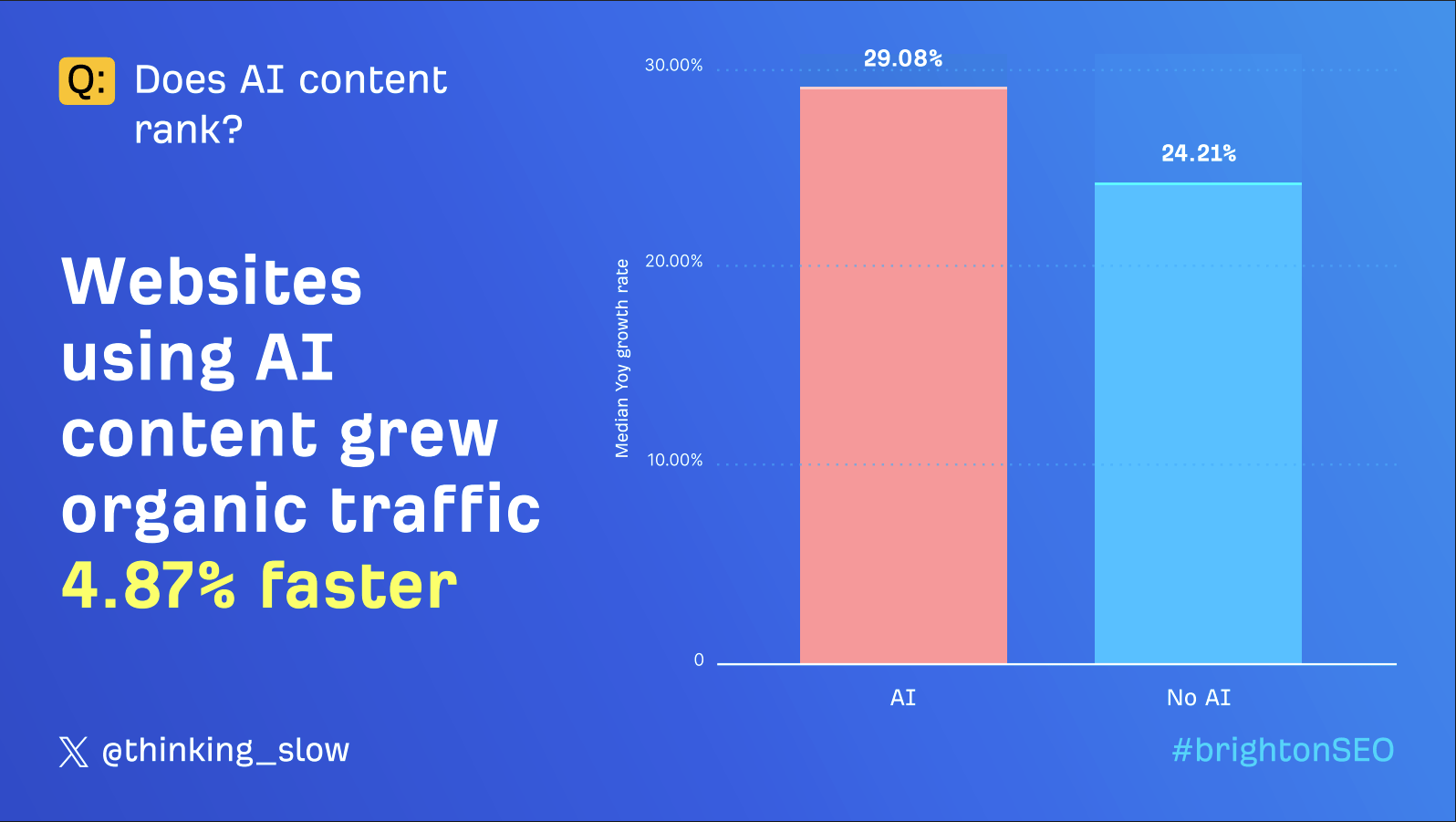
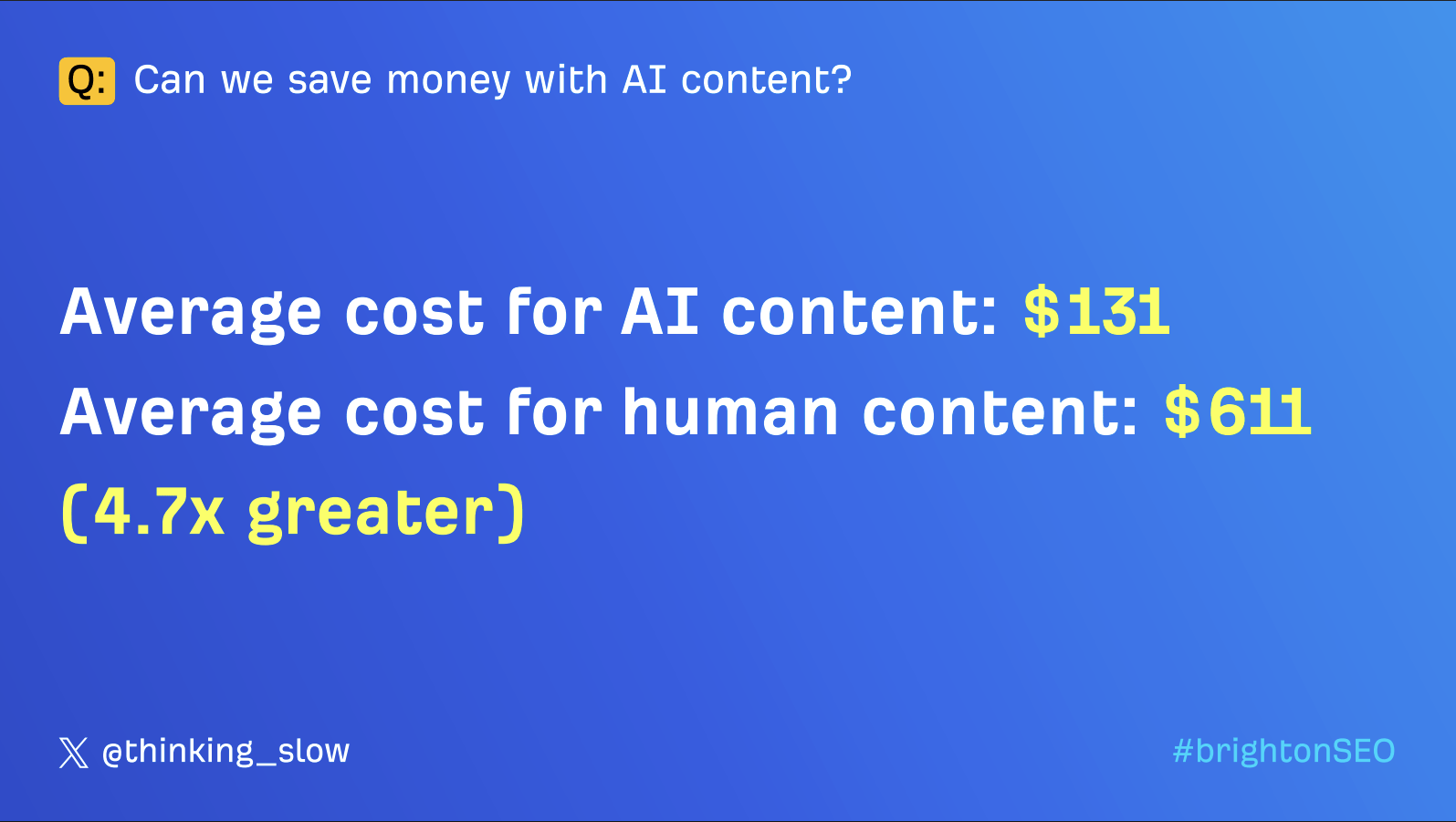
But won’t AI content get hit by algorithm update?, I hear you say. Apparently, companies who did not use AI reported a 4% greater occurrence of negative impact from an algorithm update.
On top of that, only 4% reported that they published mainly unedited AI content. So, it is all about finding the right method and balance with AI, to serve actually useful and original content to your users.
GEO is low-key still… SEO
GEO is a play on SEO (Search Engine Optimization), but adapted for the new generation of Generative AI-powered search engines like: Microsoft Copilot in Bing, Perplexity and ChatGPT browsing.
As Ray Grieselhuber, CEO of DemandSphere, mentions in his talk Exploring relationships between AI answer engines and organic SERPs, the dirty ‘secret’ is that AI search depends on traditional organic indexes.

Prompt research is the new keyword research. But where can we get data for prompt research?
It turns out, yet again, that Google is the key here. Google antitrust case has proven that they use “user interactions” to influence the ranking systems, so with 20 years dominance over the online search market, they have an unmatched data advantage.
This means that Google has more data than anybody on what people will ask about (or what they are most likely to buy). So, we can still use SERP data to tie informational queries back to commercial intent and improve on prompt discovery and targeting.
According to a DemandSphere 100K prompt study, ChatGPT 4o relied to Google and Bing Index by 51% and 14% respectively.
The key message is to recognize this as a time of transition, be quick to test and experiment with emerging platforms and behaviors, but do not abandon dominant traffic sources today to chase emerging trends.
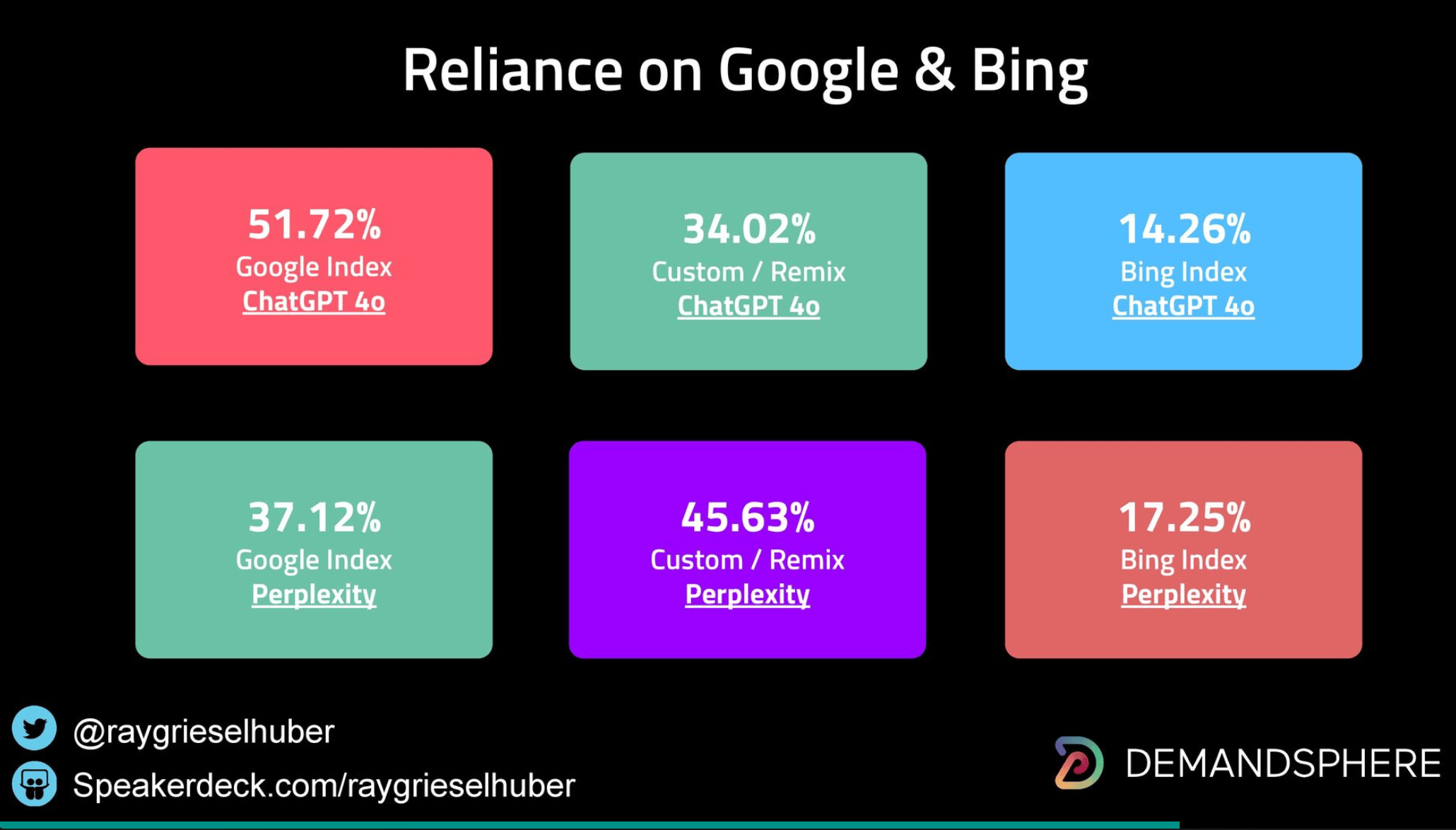
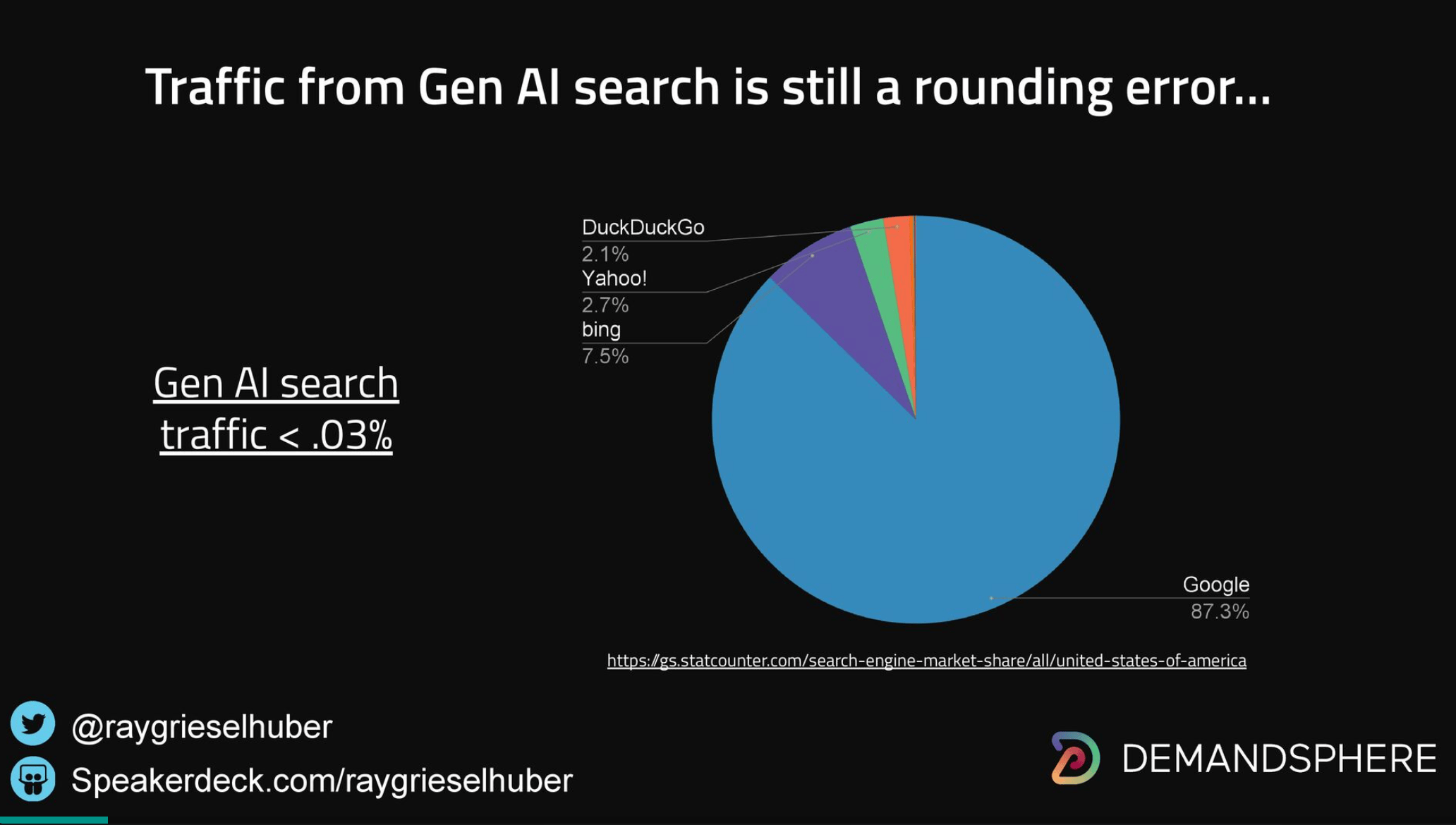
Invest in your Brand
As the keynote speaker, Lily Ray, mentioned in her talk The SEO lifecycle: lessons from the past, strategies for the future that building and maintaining a strong brand presence in the new LLM search era is increasingly important.
Google and therefore LLMs, trust brands that users trust. If people actively search for your brand name, it signals authority and relevance.
Brands are also associated with topics. Why?
Because AI engines can understand brand-topic relationships and aim to serve results aligned with user expectations.
The stronger your brand association with a niche or topic, the more likely you are to rank consistently in that space.

Branding is your insurance policy against algorithm chaos. It builds user trust, cements topic relevance, earns backlinks naturally, and helps people (and Google) remember you, which is gold in SEO.
Get Free Backlinks with Newsjacking
Newsjacking is the practice of injecting your brand, content, or expertise into trending news stories to attract attention from journalists, bloggers, and social media with the goal of earning high-quality backlinks. This can drive referral traffic to your site, build brand authority and improve your rankings.
Take for example the fake headline: “David and Victoria Beckham Announce Shock Divorce After 25 Years”. Now, how could an eCommerce site ride that wave tastefully? Katie Storey (Press Box PR, Head of Consumer) gave various examples, like:
- If you are a Fashion site, approach it with the newsjacking angle of: “Victoria’s Post-Divorce Power Look Inspires a New Wave of Chic” and publish a blog or social post featuring “5 Looks Inspired by Victoria Beckham’s Bold New Era”.
- If you are a Legal site, maybe write about “Lessons from the Beckham Divorce: Navigating High-Asset Divorces” and talk about what’s likely at stake in long-term celebrity marriages or how prenups work in high-profile cases.
You get the gist. It is an interesting approach.
Internal Linking: The constant in the ever-changing world of SEO
We also enjoyed the talk “Internal Linking: A Practical Approach for Big Websites” by Serge Bezborodov -and it hit home for anyone managing large-scale sites.
The core idea is to identify important pages we want to boost in internal link equity (Receivers) and find contextually relevant pages (Donors) where links to those Receivers can naturally live. AI-powered similarity models match Donor candidates with Receiver pages, and all relationships can be stored in a database for scalability.
This method is proposed as a complementary approach, not a replacement —think of it like a smart “related products” shelf to guide users and search engines alike.
The Lowlights
It’s your fault if you are not getting indexed
Google’s Developer Relations Engineer, Martin Splitt, explained very simply how rendering works and how it affects SEO with Rendering - what, how, why?. Apart from the how-google-processes-JS basics that we already know, he confirmed that Google does in fact render all pages - it’s just that light or html only pages are costing them basically nothing to process. The more JS, the more resources and time it takes for Google to see your content (but we are probably still talking about seconds).
However, even if your site is Javascript heavy, that is probably not the reason why it is not getting indexed. Google might be getting even better and quicker at rendering, but if your content is “shit” (as he said) it’s not gonna appear on the index.
Thanks, Martin.

What’s New?
First-Time Speaker Reflections
It’s no coincidence that BrightonSEO is probably the top conference in the field. The diverse crowd and inspiring talks are a big part of it. But it’s also exceptionally well-organized: from quiet rooms for those who need a break, to endless merch and from free ice cream to even a children’s crèche. From a speaker’s perspective, the team did everything to prepare you for the big event: guidance from a mentor, speaker training, private venue tour the day before. It all helps transform any stress into genuine excitement.
We, Skroutz SEO Team, pitched 2-3 different talks, but the one that made the cut was the “From code to clicks: onboarding developers to SEO for ecommerce success”.
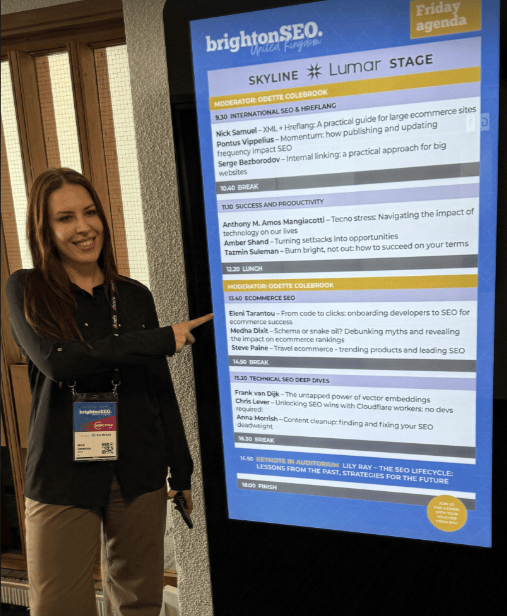
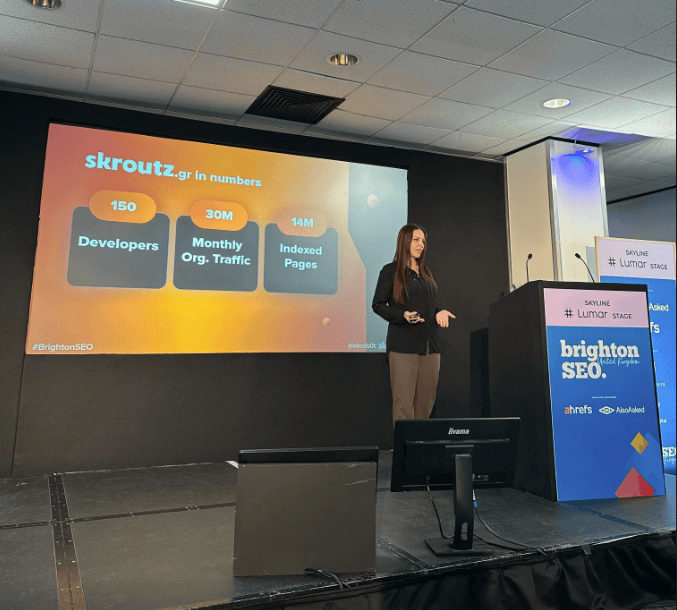
It included ideas on how to level up developer onboarding with SEO, best practices and how we have shaped them in our in-house team, as well as automations that we use and other teams might find useful.
Apart from a great experience, the talk turned out to have a great response. And the reason was: relatability.
As it was the only topic focusing on the relationship between SEO and the dev teams, we ended up having some interesting discussions in the end, on how that seems to be a pain point for many.
We came to the realization that we’ve actually built something worthwhile: a massive e-commerce website that’s grown organically into a real success and behind it is a small but mighty SEO team, holding it all together with the support of a few amazing developers who, in many cases, have proved to have a natural SEO mindset.
The automations we’ve built along the way not only have saved us significant costs on external, third-party tools, but many are also unique solutions you won’t find anywhere else.
The whole team has an “open-source” mindset, always eager to share, so it felt great to give the community a glimpse of some of our best ideas.

A Few Last Thoughts…
As established by the keynote talk The SEO lifecycle: lessons from the past, strategies for the future: the only thing constant is change.
Yes, search is changing, but that is not new. From 10 blue links to featured snippets, from desktop-only results to mobile-first indexing, from keyword stuffing to helpful content: evolution is part of the game.
What feels different now is the speed and the uncertainty.
With generative AI and new ranking systems emerging, the pace has accelerated. But at its core, SEO (or should I say GEO?) remains about understanding people, structuring information, and building real value.

Eleni Tarantou,
On Behalf of Skroutz SEO Team.-